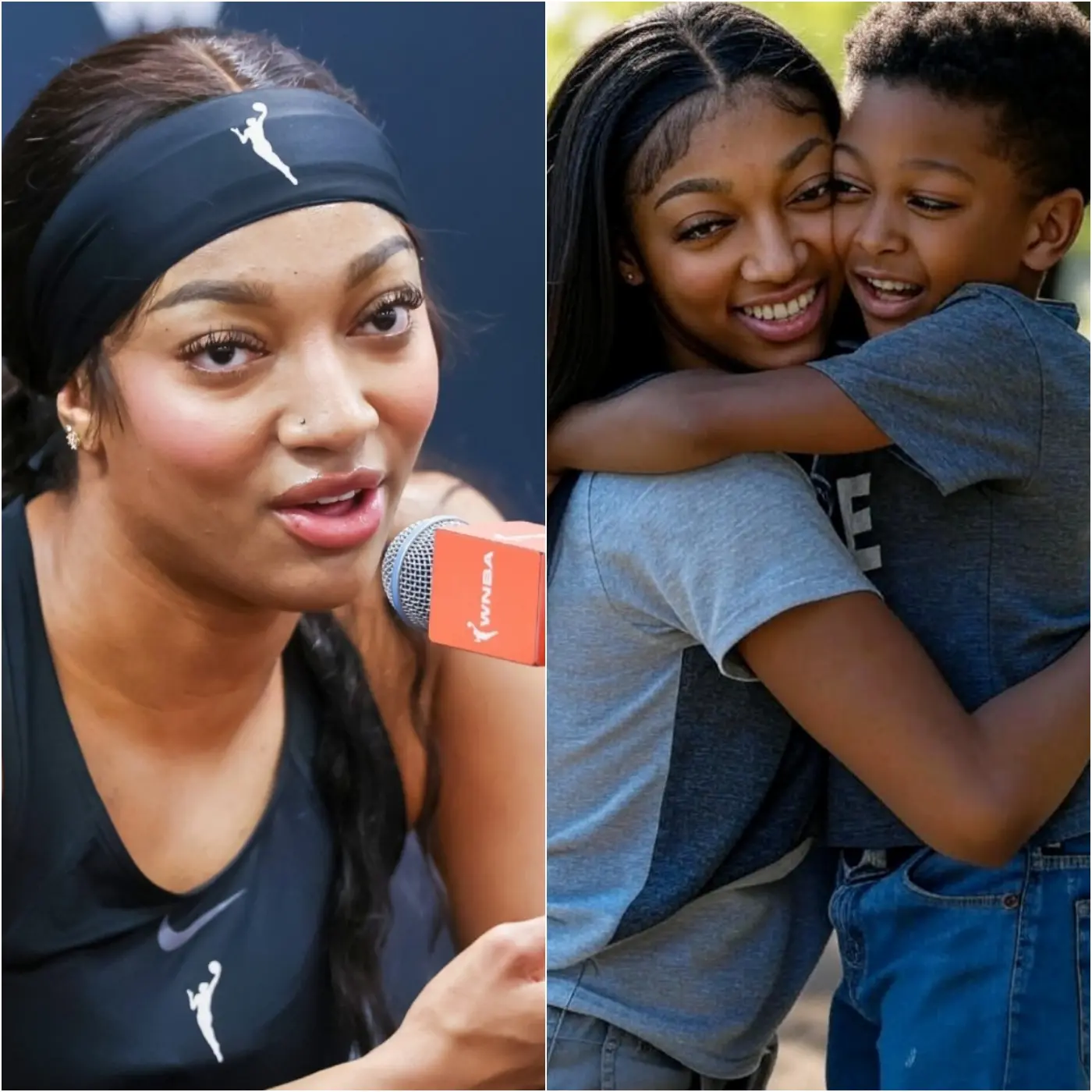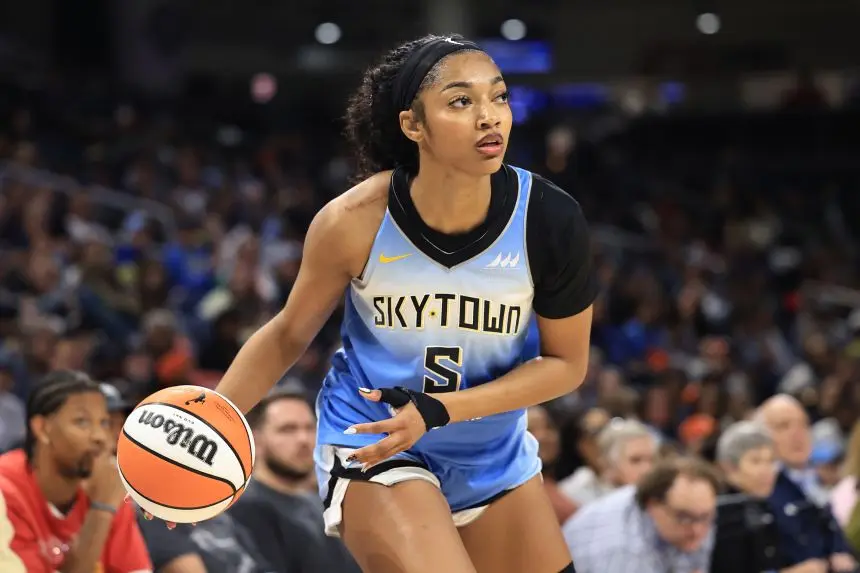In the electric hum of a packed NBA arena, where the roar of the crowd usually drowns out everything but the swish of the net, a single piece of paper carried the weight of a lifetime. It arrived in the hands of Angel Reese, the Chicago Sky’s rebounding powerhouse, just moments before tip-off. Penned by 12-year-old Mia Thompson, a devoted fan whose terminal cancer had confined her to a wheelchair, the letter trembled with raw emotion. “Angel, your strength on the court is what keeps me fighting,” it read. “I’ve watched every game, dreamed of every dunk. I will take my last breath just to see you dunk.” Those words, scrawled in a child’s fading grip, pierced through the pre-game chaos like a quiet thunderclap.

Angel Reese, at 23, has become more than a WNBA sensation—she’s a beacon for young girls chasing impossible dreams. With her signature flair and unyielding drive, she’s shattered records, grabbing 17 rebounds in a single game during her rookie season and earning All-Star nods that echo far beyond the hardwood. But on this crisp October evening in 2025, at the United Center during a high-stakes exhibition matchup between the Sky and the Lakers—part of the NBA’s pre-season showcase—the spotlight shifted from stats to something profoundly human. Mia’s mother, Elena Thompson, had pulled strings through a Make-A-Wish foundation contact to get the letter to Reese’s locker room. What happened next would etch itself into the memories of 20,000 fans, leaving the stadium in a hush that felt almost sacred.
Reese, fresh off a grueling practice where she’d been honing her post moves, unfolded the letter courtside during warm-ups. Her eyes, usually locked on the rim with laser focus, softened as she absorbed Mia’s plea. The girl, battling neuroblastoma for three years, had idolized Reese since her LSU days, when viral clips of Reese’s trash-talking tenacity went mega. “She’d watch highlights on loop, even when chemo left her too weak to hold the remote,” Elena later shared in an exclusive interview with WNBA Insider. “Angel wasn’t just a player to her; she was proof that Black girls like us could dominate spaces we were told we didn’t belong in.” Elena’s voice cracked over the phone, recounting how Mia, bald from treatments and hooked to an IV, had dictated the letter word by word. “Mom, tell her I don’t want pity. I want power—like hers.”

Five minutes. That’s all it took for Reese to transform heartbreak into heroism. As the national anthem faded and the crowd’s chants swelled—”De-fense! De-fense!”—Reese signaled to the referee during a timeout. The game, barely underway with the score tied at 12-12, paused unexpectedly. Whispers rippled through the stands. What was the Chicago Sky forward, known for her relentless energy, about to do? She grabbed the ball from the sideline, positioned herself at the top of the key, and with a nod to Mia’s front-row seat, launched into motion. The stadium lights caught the glint of determination in her eyes as she drove left, elevated off two feet, and—against all odds for a 6-foot-3 athlete in a league where dunks remain rare—slammed the ball through the hoop with both hands. The rim rattled. The ball dropped. And then, silence.
It wasn’t just a dunk; it was a vow fulfilled. The entire United Center—NBA legends like LeBron James in the VIP box, casual fans nursing beers, even the opposing Lakers bench—fell into a stunned quiet. No cheers erupted immediately. Instead, a collective breath held, as if the arena itself processed the gravity of the moment. Tears streaked Mia’s cheeks, her small hands clasped over her mouth. Reese, landing with a thud that echoed, pointed straight at her, mouthing the words, “This one’s for you, champ.” Only then did the applause crash in, wave after wave, building to a standing ovation that delayed the game by two full minutes. Cameras captured it all: the young girl’s radiant smile, the mother’s embrace, and Reese’s jersey darkened with sweat and unspoken emotion.
Reflecting on that night in a post-game presser, Reese opened up with the vulnerability that endears her to millions. “When I read that letter, it hit different,” she said, her voice steady but laced with the weight of what she’d witnessed. “Mia’s fighting battles I can’t even imagine—terminal cancer doesn’t play fair, and neither does life. But she sees me out here dunking, dominating, and thinks that’s her ticket to keep going. So I had to show her: dreams don’t expire, even when time feels short.” Reese’s words carried the authenticity of someone who’s navigated her own storms, from the racially charged rivalries that shadowed her WNBA debut to the relentless scrutiny of her every move. “I dunked for every kid like Mia who’s been told their story ends too soon,” she added. “It’s not about the highlight reel; it’s about giving them a reason to believe in tomorrow.”

Elena’s gratitude poured out in the days that followed, as social media exploded with clips of the moment—garnering over 50 million views on platforms like Instagram and TikTok. “Angel didn’t just read the letter; she lived it,” Elena told ESPN’s WNBA correspondent. “In that silence, before the cheers, I saw my daughter’s eyes light up like she’d won her own championship. Cancer took so much, but that dunk gave her back a piece of joy we thought was gone.” Mia, too weak for interviews, managed a video message from her hospital bed, her voice a whisper of wonder: “Angel, you did it. You really dunked for me. Now I know I can keep breathing a little longer.” The clip, shared by the Thompson family, went viral, touching nerves in a sports world often criticized for its detachment from real pain.
This wasn’t Reese’s first brush with fan stories that transcend the game. Earlier in the season, she’d surprised a group of underprivileged girls in Chicago with court-side tickets and a private clinic, turning skeptics into superfans. But Mia’s letter struck deeper, reminding everyone why Reese’s brand—fierce, unapologetic, and deeply compassionate—resonates so widely. In a league pushing boundaries, with attendance up 30 percent year-over-year thanks to stars like her, moments like this fuel the fire. They humanize the highlights, blending athletic prowess with empathy in a way that begs the question: what if more athletes paused to honor the quiet pleas from the stands?
As the 2025 WNBA season barrels toward playoffs, Reese carries Mia’s spirit like an extra rebound in her step. The young fan’s condition remains fragile, but her wish granted a ripple effect, inspiring donation drives and awareness campaigns for pediatric cancer research. LeBron James, tweeting from the game, called it “the real MVP play of the night—no contest.” And in the Thompson home, a framed photo of that dunk now hangs beside Mia’s hospital wristband, a testament to bonds forged in ink and inkwell slams.
Angel Reese didn’t just silence a stadium; she amplified a voice on the edge of fading. In the annals of sports lore, where dunks are measured in flair and rebounds in numbers, this one stands alone—a poetic slam against despair, proving that sometimes, the greatest victories happen when the noise stops. For Mia, for every dreamer fighting unseen wars, Reese’s gesture whispers a truth louder than any buzzer: keep dunking, even when the clock runs low. Your breath matters. Your fight inspires. And in that shared silence, a stadium full of strangers became family.